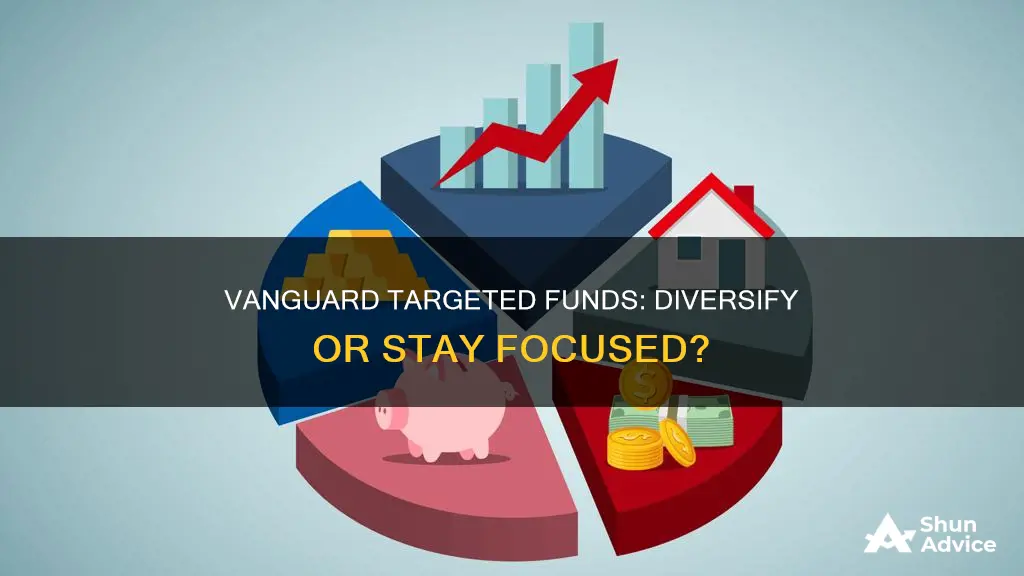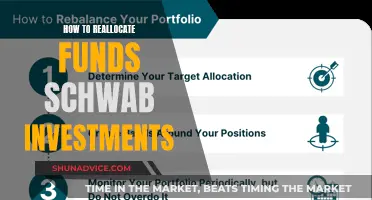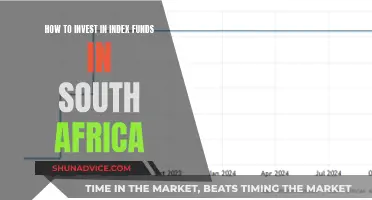
Vanguard funds are a great investment option for those seeking a sophisticated solution to the complex problem of investing for retirement. Vanguard's Target Retirement Funds offer a comprehensive approach with a low minimum investment requirement of $1,000. These funds are designed to manage risk while fostering the growth of your retirement savings. The funds' managers gradually adjust the asset allocation, reducing the number of stocks and increasing bonds to ensure a more conservative approach as you near retirement. Additionally, Vanguard funds are known for their low fees, with an average mutual fund and ETF expense ratio of 0.08%, compared to the industry average of 0.44%.
While Vanguard Target Retirement Funds provide a standalone, broadly diversified portfolio, some investors choose to include additional funds in their portfolio to further diversify their investments and maintain their risk appetite. This decision ultimately depends on your investment goals, risk tolerance, and time horizon.
| Characteristics | Values |
|---|---|
| Minimum investment per fund | $1,000 |
| Average expense ratio | 0.08% |
| Industry average expense ratio | 0.44% |
| Number of funds | 12 |
| Investment style | Diversified portfolio |
| Investment types | Stocks, bonds, money market accounts |
| Management | Automatic rebalancing |
What You'll Learn

Pros of Vanguard funds
Vanguard funds are a good choice for investors who are looking for a long-term, low-cost investment option. Here are some pros of investing in Vanguard funds:
Low Costs
Vanguard is known for its low-cost investment options, with low expense ratios on its index funds and exchange-traded funds (ETFs). This makes it an attractive option for investors looking to implement a buy-and-hold strategy over the long term.
Broad Investment Selection
Vanguard offers a wide range of investment options, including stocks, bonds, mutual funds, and ETFs. This allows investors to diversify their portfolios and access various asset classes, such as traditional stocks, funds, and fixed-income assets.
Commission-Free Trading
Vanguard offers commission-free trading on most US stocks and ETFs, as well as on their own mutual funds. This means investors can save on trading fees when buying and selling these securities.
Robust Research and Tools
Vanguard provides investors with robust research and investment tools. They offer proprietary research, especially for passive index fund investing, which is considered superb. They also have screening tools, portfolio analysis tools, and calculators to help investors make informed decisions.
Strong Reputation and Customer Service
Vanguard has a strong reputation as a client-owned entity, meaning fund shareholders own the firm. This aligns the company's interests with those of its clients. Vanguard also offers customer support via phone and email, with extended hours on weekdays, and their representatives are equipped to handle basic finance and investing questions.
Interest on Uninvested Cash
Vanguard offers a high interest rate on uninvested cash in your account. This means that any cash you have that is not currently invested can still earn you a return, which is a nice bonus.
Hedge Funds: Investment Advisory Firm Registration Status Explained
You may want to see also

Cons of Vanguard funds
While Vanguard is a reputable broker with a long track record, there are some cons to investing in their funds. Here are some disadvantages to consider:
- Basic trading platform: Vanguard's trading platform is quite basic and lacks the advanced analytical and educational tools typically offered by other brokers. This may be a drawback for active traders who rely on comprehensive platforms to make informed investment decisions.
- High investment minimums: Most Vanguard retirement funds and the Vanguard STAR Fund require a minimum investment of $1,000, while other Vanguard funds have minimums of $3,000. These initial investment amounts may be too high for beginner investors or those with limited capital.
- Limited product portfolio: Vanguard's product portfolio is focused primarily on the US market, and there is a lack of international investment options. This may be a disadvantage for investors seeking global diversification.
- Basic research tools: Vanguard's research tools are considered basic and may not provide the depth of information that more advanced investors require. The mobile app, in particular, reserves detailed information only for Vanguard products.
- High financing rates on margin trading: For advanced investors, the high financing rates associated with margin trading could be a drawback, impacting overall profitability.
- Limited deposit and withdrawal options: Vanguard offers limited options for depositing and withdrawing funds, primarily restricted to bank transfers. While ACH transfers are free, wire transfer withdrawals incur a $10 fee, which may be inconvenient for those who frequently move funds in and out of their accounts.
American City Investments: A Mutual Fund Option?
You may want to see also

What are the alternatives to Vanguard funds?
There are several alternatives to Vanguard funds, depending on your needs and preferences. Here are some options:
Interactive Brokers
This is an international broker that provides access to all asset classes. It is a good choice if you are looking for a similar range of investment products as Vanguard and is known for having low fees.
EToro
EToro is a global social trading broker. It offers a user-friendly platform and a wide range of investments, including the popular Vanguard LifeStrategy funds.
Fidelity
Fidelity is a US stockbroker that offers solid research tools, a wide product selection, and low fees. They also have a mutual fund with no expense ratio, making it a good option for investors looking for low-cost index funds.
Zacks Trade
Zacks Trade is a US discount broker that provides comprehensive research tools, a wide product selection, and low fees.
Charles Schwab
Charles Schwab is another US discount broker with a strong reputation in the industry. They are known for creating investor-friendly products with low expense ratios.
Webull
Webull is a US-based discount broker that offers commission-free trading and an easy-to-use platform.
SoFi Invest
SoFi Invest is a US discount broker that caters to beginners and investors focusing on the US market. They offer zero-commission trading and a simple platform.
Freetrade
Freetrade is a good alternative if you want to invest in individual stocks, as they offer access to over 6,000 shares. They also have a simple and user-friendly app.
Bestinvest
Bestinvest is a good alternative if you want to regularly invest smaller amounts. They offer lower minimum investment requirements and higher interest on uninvested cash compared to Vanguard.
AJ Bell Dodl
AJ Bell Dodl is a user-friendly app-based investment platform that provides access to a range of investments, including Vanguard LifeStrategy funds.
These alternatives offer similar products and target similar clients as Vanguard. When choosing an alternative, consider factors such as fees, deposit/withdrawal options, the web trading platform, and the range of markets and products available.
Invest in Suntrust Mutual Fund: Secure Your Future
You may want to see also

How do I choose the right Vanguard fund?
When choosing the right Vanguard fund, it's important to consider your financial goals, risk tolerance, and time horizon. Here are some detailed guidelines on how to choose the right Vanguard fund for your investment needs:
Define your investment goals:
Start by asking yourself what you want to achieve with your investments. Are you investing for retirement, saving for a house, or planning for your child's education? Each goal will have a different time frame and risk profile, which will influence your investment strategy.
Determine your risk tolerance:
Consider your risk tolerance and investment style. Are you comfortable with a more aggressive approach that may offer higher returns but comes with greater risk, or do you prefer a more conservative strategy with lower potential returns but less risk?
Evaluate time horizon:
Think about your investment horizon. If you're investing for the long term, such as retirement, you may want to consider a mix of stocks and bonds. Stocks typically offer higher growth potential over time, while bonds can provide stability. For shorter-term goals, consider less risky investments like money market funds or savings accounts.
Choose your investment type:
Vanguard offers various investment types, including mutual funds, exchange-traded funds (ETFs), stocks, bonds, and target-date funds. Mutual funds and ETFs are popular choices, with Vanguard known for its high-quality, low-cost options.
Assess fees and costs:
Pay attention to the fees and costs associated with different Vanguard funds. Compare expense ratios, which represent the percentage of the fund's assets used for administrative and operational expenses. Lower expense ratios mean more of your money is invested and working for you.
Diversify your portfolio:
Diversification can help reduce risk. Consider investing in a range of asset classes, such as international stocks and bonds, to spread out your investments. Vanguard's Target Retirement Funds, for example, invest in thousands of U.S. and international stocks and bonds, providing instant diversification.
Use Vanguard's resources:
Take advantage of Vanguard's tools and resources, such as their Investor Questionnaire, to help you make informed decisions. Their Quick Start tool can also help you discover resources tailored to your specific goals.
Remember, investing involves risk, and past performance does not guarantee future results. It's important to do your own research and consider seeking advice from a financial professional before investing.
Index Funds: Smart Savings or Risky Business?
You may want to see also

What are the risks of Vanguard funds?
When considering investing in Vanguard funds, it is important to be aware of the risks involved. All investing is subject to risk, and there is always the possibility of losing the money you invest. While diversification can help reduce risk, it does not guarantee a profit or protect against losses.
Vanguard Target Retirement Funds, for example, are subject to the risks of their underlying funds. These funds gradually shift from more aggressive to more conservative investments as the target retirement date approaches, but this is not a guarantee of success. Investments in bonds, which are common in retirement funds, carry interest rate, credit, and inflation risk.
Additionally, market volatility can significantly impact Vanguard funds, especially those with higher exposure to stocks. While historical data shows that market increases have compensated investors for the risk of investing in stocks, there is no guarantee that this will continue in the future.
Vanguard funds, like any other investment, carry the inherent risk of losing money. It is crucial for investors to carefully consider their risk tolerance, investment goals, and time horizon before deciding to invest. Conducting thorough research and due diligence is essential to making informed investment decisions.
Furthermore, it is worth noting that Vanguard's advice services are provided by Vanguard Advisers, Inc. ("VAI") and Vanguard National Trust Company ("VNTC"), both of which are subsidiaries of The Vanguard Group, Inc. While they offer expert help and guidance, neither VAI, VNTC, nor its affiliates guarantee profits or protection from losses.
Mutual Funds: US Market Investment Options for Indians
You may want to see also
Frequently asked questions
Vanguard targeted funds are designed to be standalone, comprising a broadly diversified portfolio in just one investment. However, investors may choose to add non-targeted investments to a targeted portfolio to make it more aggressive or conservative. For example, as a target-date investment becomes more conservative as it approaches its target date, an investor may want to retain the aggressive nature of their portfolio by introducing a riskier pure stock investment.
All investing is subject to risk. Diversification does not ensure a profit or protect against a loss in a declining market. Investments in bond funds are subject to interest rate, credit, and inflation risk.
Vanguard suggests an asset mix for your goals if you take their Investor Questionnaire. This tool takes your risk tolerance, investing experience, and time horizon into account to offer a suggestion.







